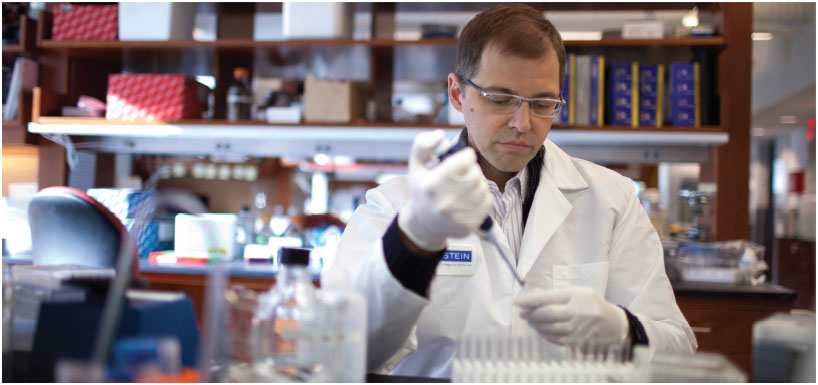
Error: No layouts found
Using antibiotics to deplete the body’s microbiome may prevent acute sickle cell crisis and could offer the first effective strategy for warding off the long-term complications of sickle cell disease (SCD), such as organ failure, according to a study by scientists at Einstein and Montefiore. The findings were published last September in Nature.
People with sickle cell disease have an inherited gene mutation that leads to abnormal hemoglobin, causing red cells to take on a sickle shape and become less flexible. The sickled red cells tend to clog small vessels—impeding blood flow and preventing oxygen from reaching tissues. The Einstein study was led by Paul S. Frenette, M.D., a professor of medicine and of cell biology and chair and director of Einstein’s Ruth L. and David S. Gottesman Institute for Stem Cell and Regenerative Medicine Research. Dr. Frenette reported in 2002 that SCD vessel blockages occur when sickled red cells bind to white cells called neutrophils that have adhered to the vessel walls.
“This earlier work indicated that some neutrophils appear to be inert while others appear overly active in promoting inflammation—which is useful for attacking microbes but causes neutrophils to capture sickled red cells inside vessels.”
In this study, Dr. Frenette’s lab found that neutrophils became more active as they aged in the circulation.
The researchers traced these “aging” signals to chemicals produced by the body’s microbiome, which cross the intestinal barrier and enter the bloodstream, generating the aged neutrophils that contribute to SCD. “Since the body’s microbiota seem to ‘educate’ neutrophils to age,” says Dr. Frenette, “we realized that purging those microbes through use of antibiotics might help against SCD.”
Dr. Frenette’s team found that SCD mice possessed five times as many aged neutrophils as healthy control mice. When the researchers depleted the microbiota of SCD mice using antibiotics, they observed a striking reduction in neutrophils. Moreover, the antibiotics appeared to prevent sickle cell crisis: interactions between neutrophils and red cells were markedly reduced, resulting in improved local blood flow and greatly improved survival of these mice.
In addition, “The spleen enlargement and liver damage were significantly reduced in the microbiota-depleted
animals,” Dr. Frenette notes.
